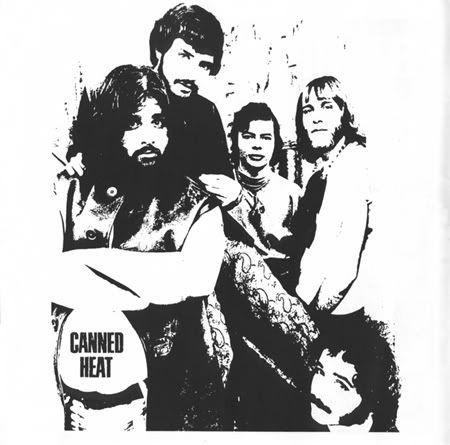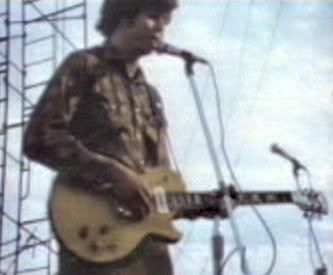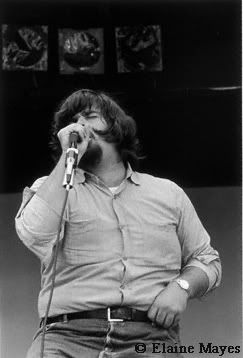Post by cofi on Aug 11, 2007 14:32:43 GMT
Canned Heat is another great band that made it over in the UK, in a big way back in the day, some great playing, and singing, and some cool harp playing 
I've always liked Alan "Blind Owl" Wilson slide guitar playing, very inventive, (and he used a gold top ;D, sorry my fav guitar) and Bob Hite ("The Bear") had some great vocals
The last time i saw the band Canned Heat, was around 2000- 2002/3 cant remember exactly, but it was at The Rock & Blues Custom Bike Show,
I still have a lot of good fond memories of the original band


Canned Heat is a blues-rock/boogie band that formed in Los Angeles in 1965. The importance of the group lies not only with their blues-based music, but with their efforts to reintroduce and revive the careers of some of the great old bluesmen, and their improvisational abilities.
The group was led by Alan "Blind Owl" Wilson (guitar, harmonica, vocals) and Bob Hite ("The Bear") (vocals, harmonica). The original line up included Keith Sawyer on drums, Mike Perlowin on lead guitar and Stuart Brotman on bass. Mike Perlowin was soon replaced by Kenny Edwards who in turn was followed by Henry Vestine (a.k.a Sunflower, an ex-member of Frank Zappa's Mothers of Invention). Larry Taylor ("The Mole") (best known up until then as the Monkees session bassist), was their studio bassist, (joining full time through 1970), along with drummer Frank Cook for their first album. Guitarist Harvey Mandel toured with the band extensively through the late 1960's. Canned Heat took their name from Tommy Johnson's 1928 "Canned Heat Blues", a song about an alcoholic who has desperately turned to drinking Sterno, which is generically called canned heat.
History
Canned Heat was started as a jug band in November 1965, in Northridge, California by a group of "musicologists" who loved blues music. Soon the band evolved into an electrified blues/rock band with the uncanny ability to interpret and create a modern version of the blues. While they never reached the popular acclaim of some of the other bands of the psychedelic era, none the less, they were a talented group of musicians who created some of the most unique music of that or any rock and roll era. Musical trends come and go. Canned Heat's "boogie music" has been at the forefront of popularizing blues music, as exemplified by such hits as "On The Road Again", "Goin' Up The Country", "Let's Work Together", "Amphetamine Annie" and "Refried Boogie. Wilson helped rediscover Son House and accompanied him on his 1965 comeback album. The group also strong-armed their record company (Liberty Records) into getting a contract for overlooked Texas bluesman Albert Collins.
Their debut album Canned Heat was released not long after their appearance at the 1967 Monterey Pop Festival. Fito De La Parra (born Adolfo De La Parra, 8 February 1946, in Mexico City) replaced Frank Cook as drummer for their second album, Boogie with Canned Heat (1968). It was more successful, spawning the hit single "On the Road Again". In 1969 they released the inconsistent double album, Livin' the Blues but it did bring them their biggest hit, "Goin' Up the Country", a song built around Henry "Ragtime Texas" Thomas' reed fife riff from the late 1920s recording "Bull Doze Blues" (often mis-cited as 'Bulldozer Blues'). Guitarist Harvey Mandel replaced Vestine for part of 1969–70. The band appeared at the August 1969 Woodstock Music and Art Festival with their performance appearing in both the album and film release.
The next year was the musical high point for the original lineup. They brought in John Lee Hooker to record the double album, Hooker 'N' Heat, in May of 1970. This was to be the first album of Hooker's career to make the charts, topping out at number 73 in February of 1971. Unfortunately, Wilson died of a drug overdose in an apparent suicide, in September 1970 prior to the album's release. Autopsy results were inconclusive and as he left no suicide note, controversy remains over this matter.
The group had one additional hit with a cover of Wilbert Harrison's "Let's Work Together".
In the 1970s, the band would be joined by lead singer Bob Hite's younger brother Richard, who sang, played bass, and helped with arrangements. During this period, they recorded "One More River to Cross" on Atlantic Records, featuring the Memphis Horns.
The last studio recording with Bob Hite was 1978's Human Condition, with Hite singing the title track, an old Alan Wilson tune that had been recorded solo by Wilson but hadn't been released. The 1981 album Kings of The Boogie also featured Hite on a couple of tracks, with Richard Kellogg and Mike Halby doing vocals on the rest of the album. A decade later came 1987's Hooker 'N Heat, (Live at the Fox Venice Theater) , (recorded and originally released in 1978, with Hite), with John Lee Hooker guesting again. Both recordings feature the guitar and vocals of Chicago's Mark Skyer, the live performance augmented by Larry Taylor on bass, (one of many short reunions), Ronnie Barron on piano, and group vocals by the Chambers Brothers.
Bob Hite died in April, 1981 (as did Vestine in 1997 and Richard Hite in 2001), and was replaced by Richard Kellogg as lead vocalist. By 1989 the trajectories of Hooker and Canned Heat crossed once again. This time they guested on his album, The Healer, which was a big hit. De La Parra leads the current band and Larry Taylor returned in 1994 after leaving in 1970. Taylor continues to be "first chair" bass with many top acts, including Kim Wilson and Tom Waits, "returning" numerous times to do special events and recordings with Canned Heat.
Ex-Heat guitarist Harvey Mandel was one of the guitarists considered to replace the departed Mick Taylor in the Rolling Stones, with his efforts appearing on the 1976 Stones album Black and Blue. His extensive soloing is featured on "Hot Stuff". Mandel continued to record, self releasing albums, and in 2004, oddly enough, recorded a song written by MP3.com co-founder Rod Underhill, a musician and lawyer who served as the founding music director for the original MP3.com. Mandel is currently recording and touring with the "Chicago Blues Reunion", along with Nick Gravenites, Barry Goldberg, Tracy Nelson, Sam Lay, and Corky Siegel.
The Present

Canned Heat continues today with long time members Fito de la Parra and Larry "the Mole" Taylor leading the way. Vocal duties have been handled over the years by Walter Trout, James Thornberry and Robert Lucas. Recently, Fito de la Parra has written a book, "Living the Blues," which chronicles the history of Canned Heat. "don't forget to boogie".
Great Band



I've always liked Alan "Blind Owl" Wilson slide guitar playing, very inventive, (and he used a gold top ;D, sorry my fav guitar) and Bob Hite ("The Bear") had some great vocals

The last time i saw the band Canned Heat, was around 2000- 2002/3 cant remember exactly, but it was at The Rock & Blues Custom Bike Show,
I still have a lot of good fond memories of the original band



Canned Heat is a blues-rock/boogie band that formed in Los Angeles in 1965. The importance of the group lies not only with their blues-based music, but with their efforts to reintroduce and revive the careers of some of the great old bluesmen, and their improvisational abilities.
The group was led by Alan "Blind Owl" Wilson (guitar, harmonica, vocals) and Bob Hite ("The Bear") (vocals, harmonica). The original line up included Keith Sawyer on drums, Mike Perlowin on lead guitar and Stuart Brotman on bass. Mike Perlowin was soon replaced by Kenny Edwards who in turn was followed by Henry Vestine (a.k.a Sunflower, an ex-member of Frank Zappa's Mothers of Invention). Larry Taylor ("The Mole") (best known up until then as the Monkees session bassist), was their studio bassist, (joining full time through 1970), along with drummer Frank Cook for their first album. Guitarist Harvey Mandel toured with the band extensively through the late 1960's. Canned Heat took their name from Tommy Johnson's 1928 "Canned Heat Blues", a song about an alcoholic who has desperately turned to drinking Sterno, which is generically called canned heat.
History
Canned Heat was started as a jug band in November 1965, in Northridge, California by a group of "musicologists" who loved blues music. Soon the band evolved into an electrified blues/rock band with the uncanny ability to interpret and create a modern version of the blues. While they never reached the popular acclaim of some of the other bands of the psychedelic era, none the less, they were a talented group of musicians who created some of the most unique music of that or any rock and roll era. Musical trends come and go. Canned Heat's "boogie music" has been at the forefront of popularizing blues music, as exemplified by such hits as "On The Road Again", "Goin' Up The Country", "Let's Work Together", "Amphetamine Annie" and "Refried Boogie. Wilson helped rediscover Son House and accompanied him on his 1965 comeback album. The group also strong-armed their record company (Liberty Records) into getting a contract for overlooked Texas bluesman Albert Collins.
Their debut album Canned Heat was released not long after their appearance at the 1967 Monterey Pop Festival. Fito De La Parra (born Adolfo De La Parra, 8 February 1946, in Mexico City) replaced Frank Cook as drummer for their second album, Boogie with Canned Heat (1968). It was more successful, spawning the hit single "On the Road Again". In 1969 they released the inconsistent double album, Livin' the Blues but it did bring them their biggest hit, "Goin' Up the Country", a song built around Henry "Ragtime Texas" Thomas' reed fife riff from the late 1920s recording "Bull Doze Blues" (often mis-cited as 'Bulldozer Blues'). Guitarist Harvey Mandel replaced Vestine for part of 1969–70. The band appeared at the August 1969 Woodstock Music and Art Festival with their performance appearing in both the album and film release.
The next year was the musical high point for the original lineup. They brought in John Lee Hooker to record the double album, Hooker 'N' Heat, in May of 1970. This was to be the first album of Hooker's career to make the charts, topping out at number 73 in February of 1971. Unfortunately, Wilson died of a drug overdose in an apparent suicide, in September 1970 prior to the album's release. Autopsy results were inconclusive and as he left no suicide note, controversy remains over this matter.
The group had one additional hit with a cover of Wilbert Harrison's "Let's Work Together".
In the 1970s, the band would be joined by lead singer Bob Hite's younger brother Richard, who sang, played bass, and helped with arrangements. During this period, they recorded "One More River to Cross" on Atlantic Records, featuring the Memphis Horns.
The last studio recording with Bob Hite was 1978's Human Condition, with Hite singing the title track, an old Alan Wilson tune that had been recorded solo by Wilson but hadn't been released. The 1981 album Kings of The Boogie also featured Hite on a couple of tracks, with Richard Kellogg and Mike Halby doing vocals on the rest of the album. A decade later came 1987's Hooker 'N Heat, (Live at the Fox Venice Theater) , (recorded and originally released in 1978, with Hite), with John Lee Hooker guesting again. Both recordings feature the guitar and vocals of Chicago's Mark Skyer, the live performance augmented by Larry Taylor on bass, (one of many short reunions), Ronnie Barron on piano, and group vocals by the Chambers Brothers.
Bob Hite died in April, 1981 (as did Vestine in 1997 and Richard Hite in 2001), and was replaced by Richard Kellogg as lead vocalist. By 1989 the trajectories of Hooker and Canned Heat crossed once again. This time they guested on his album, The Healer, which was a big hit. De La Parra leads the current band and Larry Taylor returned in 1994 after leaving in 1970. Taylor continues to be "first chair" bass with many top acts, including Kim Wilson and Tom Waits, "returning" numerous times to do special events and recordings with Canned Heat.
Ex-Heat guitarist Harvey Mandel was one of the guitarists considered to replace the departed Mick Taylor in the Rolling Stones, with his efforts appearing on the 1976 Stones album Black and Blue. His extensive soloing is featured on "Hot Stuff". Mandel continued to record, self releasing albums, and in 2004, oddly enough, recorded a song written by MP3.com co-founder Rod Underhill, a musician and lawyer who served as the founding music director for the original MP3.com. Mandel is currently recording and touring with the "Chicago Blues Reunion", along with Nick Gravenites, Barry Goldberg, Tracy Nelson, Sam Lay, and Corky Siegel.
The Present

Canned Heat continues today with long time members Fito de la Parra and Larry "the Mole" Taylor leading the way. Vocal duties have been handled over the years by Walter Trout, James Thornberry and Robert Lucas. Recently, Fito de la Parra has written a book, "Living the Blues," which chronicles the history of Canned Heat. "don't forget to boogie".
Great Band











